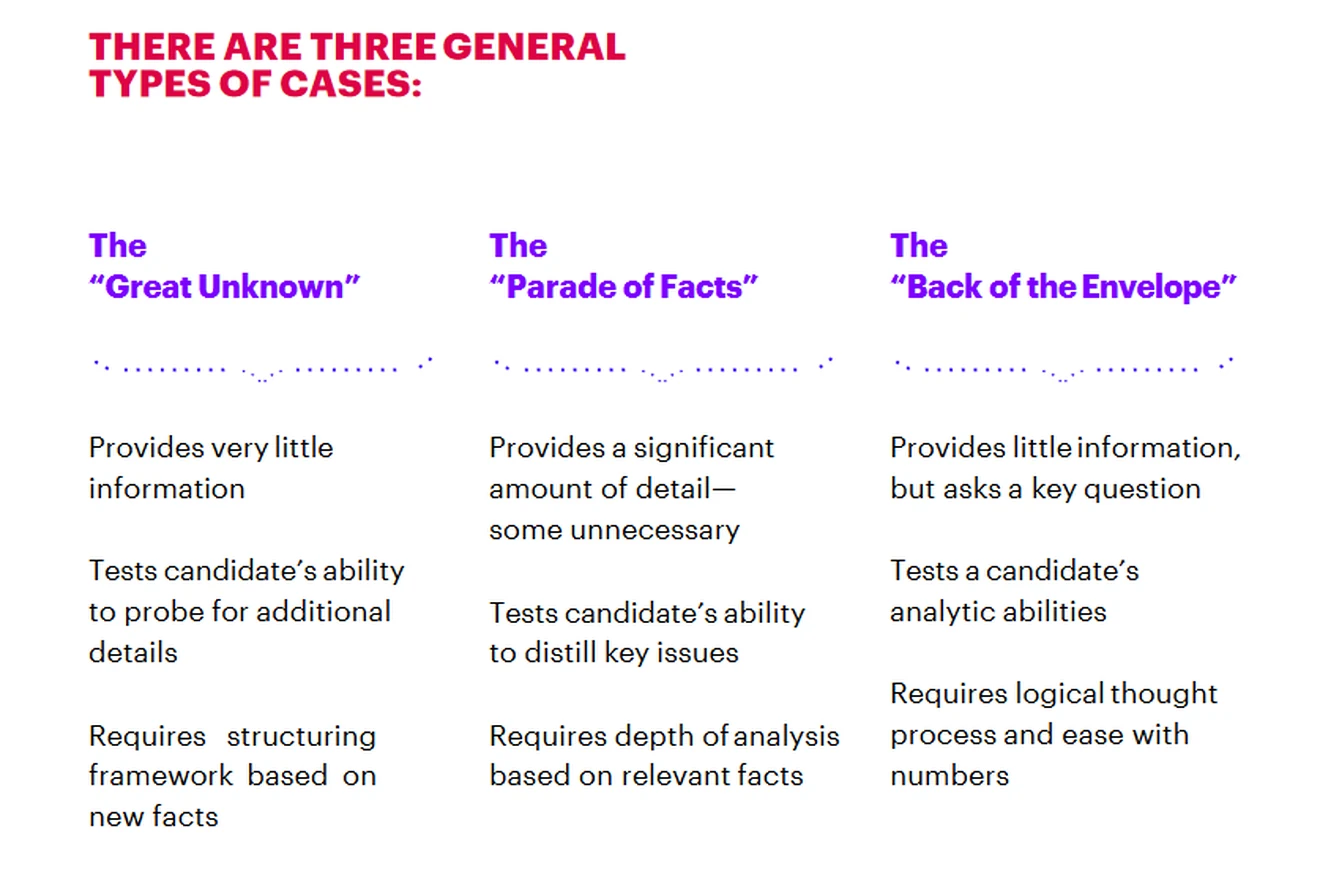Accenture interviews are pretty challenging compared to regular interviews at large corporations. The questions are difficult and the interview format is specific to Accenture.
But the good news is that, with the right preparation, it can actually become relatively straightforward to succeed at an Accenture interview. We've put together this ultimate guide to maximise your chances of success.
Here's an overview of what we'll cover.
- Accenture overview
- Accenture interview process
- Accenture case interviews
- Accenture Potentia interview
- Accenture Fit / PEI interviews
- How to prepare
Click here to practise 1-on-1 with Accenture ex-interviewers
1. Accenture overview
Accenture is a consulting giant, with more than 500,000 employees across 120 countries. It can roughly be broken into three parts; management consulting, IT consulting, and what is often called 'Back office', which includes accounting services, sales, customer support, etc.
This interview guide is for candidates applying for management consulting roles at Accenture (if you're applying for another tech role, such as software engineering, we recommend you use the prep articles on our engineering blog).
Management consulting is further divided into three groups:
1) Accenture Strategy (focused on strategy,competes with McKinsey, BCG, etc)
2) Operations (focused on implementation of business initiatives)
3) Digital (focused on implementation of digital business initiatives)
Next, let's outline the different stages of your interview process with Accenture.
2. Accenture interview process
The exact Accenture interview process will depend on which of the management consulting areas you're applying for, but generally there are three of four stages:
- Resume and cover letter screening
- First round of interviews
- Second round of interviews
- Accenture Potentia (Strategy roles only)
2.1 Resume and cover letter screening
First, recruiters will look at your resume and assess if your experience matches the open position. This is the most competitive step in the process—we’ve found that 90% of candidates don’t make it past this stage.
You can use this free resume guide and this free cover letter guide to help tailor your application to the position you’re targeting.
And if you’re looking for expert feedback, you can also get input from our team of ex-MBB recruiters and interviewers, who will cover what achievements to focus on (or ignore), how to fine tune your bullet points, and more.
2.2 Interview rounds
After sending your resume and cover letter you should prepare yourself for two to three rounds of interviews with Accenture Consultants, Managers and Managing Directors (equivalent to partner).
As a general rule of thumb, your interviewers will be more and more senior as you progress through the different rounds. Your last interview will generally be with a Senior Managing Director (equivalent to Senior Partner) who will make a final decision on whether the firm should give you an offer or not.
During each round you can expect between one and three interviews which are usually a mix of fit / behavioural questions (e.g. Why consulting?) as well as case interview questions.
If you are applying for Accenture Strategy, one of your interviews will be a 1-hour assessment called the Potentia Interview. We'll go into more detail on that in section 4 below.
3. Accenture case interviews
Accenture uses candidate-led case interviews similar to BCG and Bain. As the candidate, this means that you should be prepared to lead the conversation and suggest next steps for how to analyse and solve the case.
Accenture divides its case interviews into three types.

1. "The Great Unknown" questions
Don't be confused by the name, these are your typical case interview questions used by all consulting companies. You'll receive one or two sentences with a case problem. You'll need to ask the right questions to establish further facts and construct a solution.
Example: "The client, a leading manufacturer of prefabricated kitchen furnishings, has been steadily losing market share over the last two years. The senior executive team would like you to help them understand why and what they can do to improve their market standing."
To prepare for these types of questions, use our case case interview prep guide.
2. "Parade of facts" questions
These case problems are a little bit different to the usual ones.. You will be given a deluge of facts in the case description, and one of your key tasks is determining which facts are relevant to the client’s business problem.
Accenture doesn't use these questions as often as the others, but you'll still need to prepare properly.
2. "Back of the envelope" questions.
These are typical market sizing questions, such as "Estimate the total number of dry cleaners in Philadelphia."
Accenture uses these a lot and you should be well prepared. Use our market sizing questions guide to learn how best to answer these, and then use our market sizing questions article to practise with.
4. Accenture Potentia interview
As we mentioned above, if you're an Accenture Strategy candidate, you'll face a 1-hour "Potentia" interview. You will be given a short paragraph of text about a broad business topic (e.g. how to manage intellectual property in the age of Chat GPT). You will then have 5 minutes to analyse the text and the question it raises.
After this, you will need to present your initial thoughts to your interviewer and they will then follow up with a series of questions. The whole interview will last 45-60 minutes and should feel like a conversation. Its main objective is to test your creativity and it therefore won't involve any calculations.
As we have previously mentioned, creativity questions are frequent in case interviews. This type of question can be a little tricky to answer. The most common mistake candidates make with creativity questions (and the Potentia Interview) is to brainstorm ideas in an unstructured way. Jumping from one idea to another without any overarching structure makes it really hard for your interviewer to follow your thoughts.
Instead, we suggest that you use the following two-step approach to impress your interviewer:
- Use a framework. At the beginning of your Potentia Interview, you should lay out a high-level framework to structure the different types of ideas you have to answer the question you are asked.
- Brainstorm within each branch. Once you have established a framework, you can then brainstorm ideas within each branch of your framework. As a rule of thumb, you should aim to generate 2 to 5 ideas per branch.
Using a framework and brainstorming within branches will go a long way in ensuring you do well at your Potentia Interview. But, it’s also helpful to think about how your interviewer will assess your answers. In short, they will look at two criteria:
- Range of thought. You interviewer wants you to demonstrate that you can generate a broad range of ideas. You can achieve this by both going wide in your framework (e.g. having 4 or 5 branches). But also by going deep in each branch (e.g. having 4 or 5 ideas per branch).
- Practicality. Your interviewer will also assess how practical your ideas are. In practice, that means you should aim to have a mix of ambitious long-term ideas but also shorter-term ones which you feel can be implemented relatively easily.
5. Accenture Fit / PEI interviews
You can expect to face typical fit or "personal experience" questions at the end or beginning of each Accenture case interview:
Top 5 Accenture fit questions:
- Why Accenture?
- Why consulting?
- Walk me through your resume
- Tell me about something not on your resume
- Tell me about your greatest accomplishment
Top 5 PEI questions. Tell me about a time when ...
- You led a team through a difficult situation
- You worked in a team and had to manage a conflict
- You had a disagreement with a colleague / boss
- You had to change someone's / a group's mind
- You overcame a really difficult challenge
Don't fall into the trap of under-preparing for these types of questions. While they may seem easier than the case interviews, they are extremely important to get right.
You’ll need to prepare several ”stories” or “examples” from your personal and professional experience to demonstrate that you have the traits that Accenture is looking for.
To learn more, check out our guide to consulting fit / PEI questions.
6. How to prepare for your Accenture case interviews
Now you've seen the different types of questions in the Accenture interview process, let's look at the steps you need to take to make sure you ace your Accenture interview.
6.1 Learn the case interview essentials
For your case interviews, Accenture provide a very useful case workbook which you should definitely read though as part of your preparation.
However, while the workbook is a great starting point, you'll need to use much more detailed prep materials. For example, it lists 5 key frameworks that you'll need to be very familiar with, but we recommend you learn seven and combine them to create your own.
A great starting point for your case interview prep is our case interview prep guide. You can also watch the example video below. Although the video is labeled for BCG and Bain, the interviews you will come across at Accenture will be similar.
6.2 Become really confident at maths
You don't have to have a perfect GPA or GMAT score to succeed at case interview maths. However, during your Accenture interviews, you will be expected to quickly perform accurate mental maths.
In order to do this, it’s essential to know the formulas for common metrics, like return on investment or breakeven point. And it’s also helpful to know a few maths shortcuts to help you solve problems more quickly. To learn more about these topics, check out our free guide to case interview maths.
In our experience, the most successful applicants start their interview preparation by practising maths skills, so make sure you prioritise this step.
6.3 Research the company
Accenture interviewers want to hire candidates who are deeply motivated to work for their firm. Make sure you're up to date in the latest developments in the area of the company you're applying to join. Here are some useful links to get you started:
In addition, do some networking so that you can show you've made the effort to reach out to current staff.
6.4 Practise with peers
Once you're in command of the subject matter, you'll want to start practising cases. But by yourself, you can’t simulate thinking on your feet or the pressure of performing in front of a stranger. Plus, there are no unexpected follow-up questions and no feedback.
If you have friends or peers who can do mock interviews with you, that's an option worth trying. It’s free, but be warned, you may come up against the following problems:
- It’s hard to know if the feedback you get is accurate
- They’re unlikely to have insider knowledge of interviews at your target company
- On peer platforms, people often waste your time by not showing up
For those reasons, many candidates skip peer mock interviews and go straight to mock interviews with an expert.
6.5 Practise with experienced case interviewers
In our experience, practising real interviews with experts who can give you company-specific feedback makes a huge difference.
Find a consulting interview coach so you can:
- Test yourself under real interview conditions
- Get accurate feedback from a real expert
- Build your confidence
- Get company-specific insights
- Learn how to tell the right stories, better.
- Save time by focusing your preparation
Landing a job at a top consulting company often results in a $50,000 per year or more increase in total compensation. In our experience, three or four coaching sessions worth ~$500 make a significant difference in your ability to land the job. That’s an ROI of 100x!















